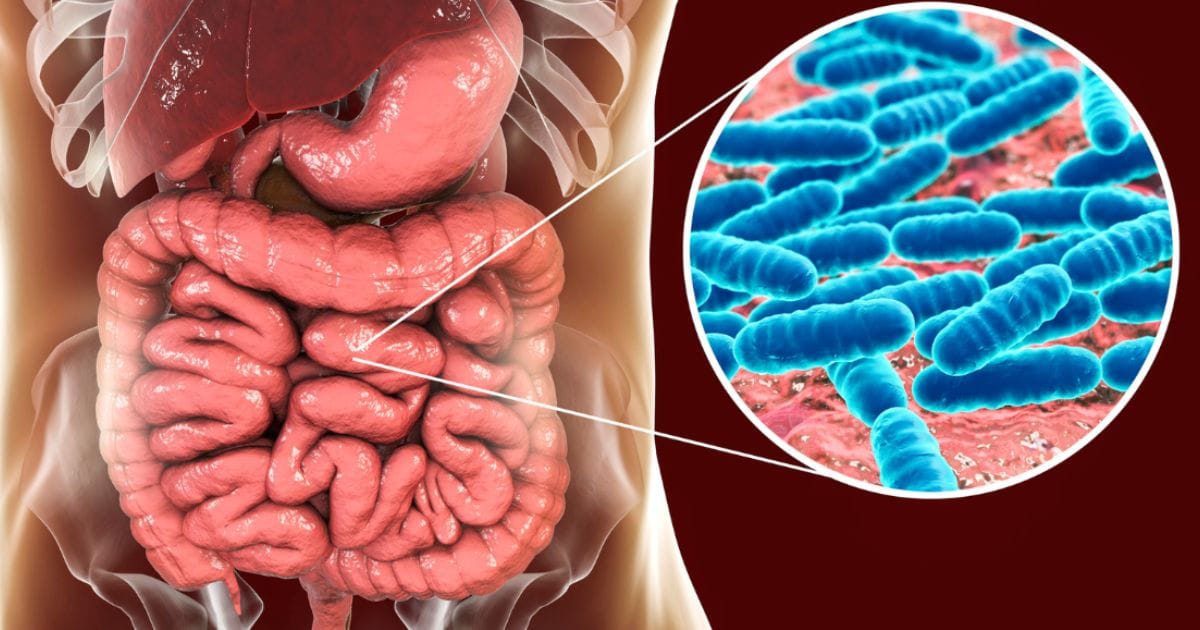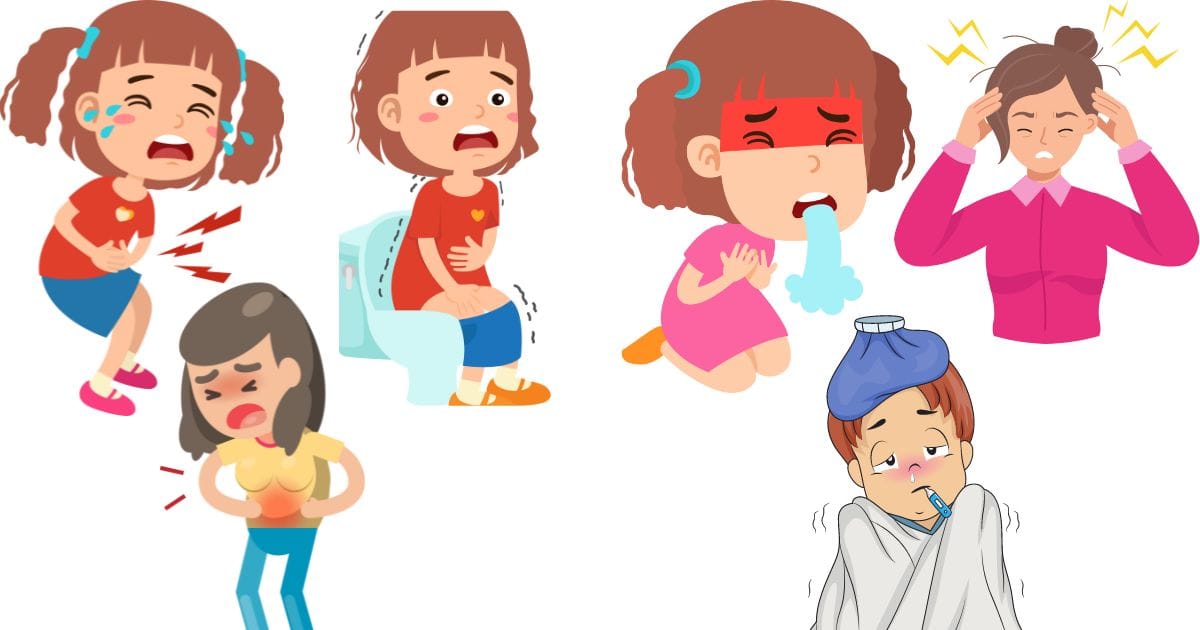What is stomach flu?

The stomach flu, or viral gastroenteritis, is an unwelcome visitor affecting millions worldwide. With its unpleasant symptoms like diarrhea, vomiting, and nausea, it can leave you feeling miserable and drained. But fear not; armed with knowledge, you can weather this storm!
Why is viral gastroenteritis called “stomach flu?”
Why is viral gastroenteritis called “stomach flu?”
The nickname “stomach flu” for viral gastroenteritis, though widely used, can be misleading. Here’s why
Different culprits, different illnesses
- Influenza – Caused by the influenza virus, it primarily affects the respiratory system, causing symptoms like fever, cough, sore throat, and body aches.
- Viral gastroenteritis – Caused by various viruses, including norovirus, rotavirus, and adenovirus, it primarily affects the digestive system, leading to diarrhea, vomiting, nausea, and abdominal cramps.
Several factors might have contributed to the misnomer “stomach flu”
- Seasonality – Both influenza and some gastroenteritis viruses peak during winter months, creating a perceived association.
- Symptoms – Some initial symptoms like nausea and vomiting can be shared by both, though they progress differently.
- Informal language – The term “stomach flu” might simply be a convenient shorthand for any illness causing stomach upset.
It’s important to remember
Using the accurate term “viral gastroenteritis” helps with clear communication and understanding of the specific illness.
By being mindful of the distinction, you can ensure you get the right information and care when facing stomach woes.
Unraveling the Culprits
While often called the “stomach flu,” it’s unrelated to influenza. The true culprits are viruses, with norovirus being the most common offender. Rotavirus and adenovirus can also play a role, especially in young children.

The stomach flu’s journey begins with contaminated food, water, or surfaces. Unwashed hands become unwitting transporters and close contact with infected individuals adds fuel to the fire. Once inside, the virus wreaks havoc on your intestines, leading to inflammation and the dreaded symptoms.
Diarrhea – Watery stools are the trademark, causing dehydration and electrolyte imbalance.
Vomiting – The forceful expulsion of stomach contents, adding to the misery and dehydration.
Nausea – A feeling of sickness and aversion to food, further complicating recovery.
Abdominal cramps – Painful muscle contractions in your gut add to discomfort.
Fever – Your body’s attempt to fight the infection, but it can add to the general malaise.
Muscle aches and headache – Accompanying symptoms contribute to the feeling of being unwell.
The Duration of the Distress
Typically, the stomach flu runs its course within 1-3 days, although it can linger up to 10 days. The good news is you become less contagious as symptoms subside. However, remember you might still be shedding the virus for up to two weeks after recovery, so caution remains critical.
Conquering the Conquest – (Treatment of Stomach Flu)
While there’s no magic cure, several strategies can help you ease through the discomfort and expedite recovery
- Hydration is paramount – Water, clear broths, or electrolyte-rich drinks are your allies. Dehydration is a serious concern, so prioritize replenishing lost fluids.
- Rest is your refuge – Give your body the energy to fight the infection by prioritizing sleep and avoiding strenuous activities.
- Bland is your best friend – Opt for easily digestible foods like crackers, toast, rice,yougurt and bananas. Avoid greasy, spicy, or sugary options that can irritate your gut further.
- Over-the-counter comfort – Medications like ibuprofen or acetaminophen can help manage fever and pain. Consult your doctor before taking any medication, especially if you have pre-existing medical conditions.
- Seek medical attention when needed – If you experience severe vomiting or diarrhea, blood in your stool, high fever, or concerning dehydration symptoms, consult a doctor promptly.
Preventing the Pestilence
Prevention is always better than cure. Here’s how to keep the stomach flu at bay
- Wash your hands frequently and thoroughly – Soap and water are your weapons against viral invaders.
- Cook food properly – Ensure safe food handling practices to eliminate potential contamination.
- Avoid close contact with sick individuals – Maintain a safe distance to avoid exposure to the virus.
- Practice good hygiene – Disinfect frequently touched surfaces and avoid sharing utensils.
What does the beginning of stomach flu look like?
The beginning of the stomach flu, or viral gastroenteritis, can sometimes be subtle and easily mistaken for other things. Here’s a breakdown of what you might experience
Early Signs and Symptoms
- General Malaise – You might feel a vague sense of tiredness, weakness, or a “not right” feeling. This could be accompanied by a mild headache or muscle aches.
- Loss of Appetite – Food might suddenly seem unappealing, or you might have a decreased appetite compared to usual.
- Mild Nausea – A feeling of unease or queasiness in your stomach might come and go, not necessarily intense but enough to be noticeable.
- Abdominal Discomfort – You might experience mild bloating, gas, or a dull ache in your abdomen.
What are the stages of Stomach Flu?
The stomach flu, or viral gastroenteritis, doesn’t progress through distinct, easily defined stages. However, we can talk about different phases based on the typical symptom presentation.
Incubation Phase
- This is the period between catching the virus and experiencing symptoms. It usually lasts 1-3 days but can sometimes be longer. You won’t feel sick during this phase, but you are contagious and can spread the virus to others.
Prodromal Phase
This is the early stage when you begin to feel unwell. Symptoms might be mild and could include
- Fatigue
- General malaise
- Loss of appetite
- Mild nausea
- Headache
- Muscle aches
Acute Phase
This is the most intense phase, with symptoms typically peaking within 1-2 days. You might experience
- Severe nausea and vomiting
- watery diarrhea
- Abdominal cramps
- Fever
- Chills
Recovery Phase
As your body fights off the virus, symptoms gradually improve. This usually takes 1-3 days but can sometimes last up to 10 days. You might still experience the following
- Mild diarrhea
- Reduced appetite
- Fatigue
How long does Stomach Flu last?
The duration of the stomach flu, also known as viral gastroenteritis, can vary from person to person but typically falls within a specific range
Most Common Duration
Generally, the stomach flu lasts for 1-3 days. This is when most people experience the peak of their symptoms, including vomiting, diarrhea, and nausea.
Is Stomach Flu contagious?
The stomach flu, also known as viral gastroenteritis, is highly contagious.
Here’s what you need to know
How it spreads – The virus can spread through several ways
- Direct contact – This includes contact with infected individuals, such as shaking hands, hugging, or kissing.
- Contaminated surfaces – The virus can live on surfaces like doorknobs, countertops, and toys for several hours. You can become infected if you touch a contaminated surface and then touch your face.
- Contaminated food or water – Eating or drinking food or water contaminated with the virus can also make you sick.
- Contagious period – You are contagious with the stomach flu as long as you have symptoms, and sometimes for up to 2 weeks after you recover. This means you can spread the virus even if you’re feeling better.
How to treat Stomach Flu?
Unfortunately, there’s no specific cure for the stomach flu, as it’s caused by a virus that runs its course. However, several strategies can help manage symptoms, ease discomfort, and expedite recovery
Focus on Hydration
- Dehydration –It’s a serious concern, especially for young children and older adults.
Replenish lost fluids with water, which is your primary weapon against dehydration. Drink frequently, even if in small sips. - Clear broths – Offer options like chicken or vegetable broth for added electrolytes.
Oral rehydration solution (ORS) is crucial for children and severe cases. Consult your doctor or pharmacist for commercially available ORS packets or prepare a homemade solution following WHO guidelines. - Rest is Your Refuge – Give your body the energy it needs to fight the infection. Prioritize sleep and avoid strenuous activities.
Bland is Your Best Friend.
Opt for easily digestible foods that won’t irritate your gut further-Khichdi A staple in Pakistan, khichdi’s rice and lentil combination is gentle on the stomach.
- Toast – Plain toast is easily tolerated and provides some energy.
- Rice – White rice is bland and easily digestible.
- Bananas – Rich in potassium, a crucial electrolyte lost through diarrhea.
Over-the-Counter Comfort
- Medications like ibuprofen or paracetamol can help manage fever and aches.
- Consult your doctor before taking any medication, especially if you have pre-existing conditions.
- Seek Medical Attention When Needed.
- Don’t hesitate to consult a doctor if you experience Severe vomiting or diarrhea (incredibly bloody stools).
- High fever (particularly in children)
- Signs of dehydration (dizziness, lightheadedness, decreased urination)
- Symptoms persisting for more than a few days or worsening significantly
Additional Tips
- Probiotics – May help shorten the duration of symptoms, but consult your doctor for recommendations.
- Heating pad – Apply a warm compress on your abdomen for abdominal cramps.
- Avoid – Greasy, spicy, or sugary foods, caffeine, and alcohol, as they can worsen symptoms.